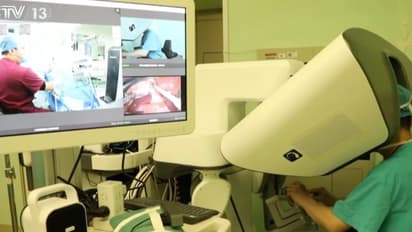Medical marvel: China's Apstar-6D, located 36,000 kms above Earth, conducts world's 1st surgery via satellite

Synopsis
The surgeries were carried out using the Apstar-6D broadband communications satellite, located 36,000 kilometers above Earth, according to the South China Morning Post.
China has successfully conducted the world’s first satellite-based, ultra-remote surgeries, marking a significant milestone in medical technology that could revolutionize trauma care, especially in high-intensity combat zones and remote locations. The surgeries were carried out using the Apstar-6D broadband communications satellite, located 36,000 kilometers above Earth, according to the South China Morning Post.
In a groundbreaking achievement, doctors from the People’s Liberation Army General Hospital performed five remote surgeries on patients in Beijing, with the medical teams based in Lhasa (Tibet), Dali (Yunnan), and Sanya (Hainan). The procedures, which included liver, gallbladder, and pancreas surgeries, were conducted with the aid of a domestically developed robotic surgical system. Remarkably, all patients made a full recovery and were discharged the following day, as reported by state broadcaster CCTV.
Each of these surgeries relied on a complex technological network where the data for each surgical movement traveled a two-way distance of nearly 150,000 kilometers, showcasing the feasibility, safety, and effectiveness of using satellite-based communication and robotic systems for long-distance medical interventions.
"This series of remote surgeries spanned China’s mountains and straits, demonstrating both the feasibility and effectiveness of performing complex operations using satellite and robotic technologies," CCTV reported.
Apstar-6D: The Backbone of Satellite-Based Surgery
The Apstar-6D satellite, launched in 2020, played a pivotal role in this achievement. Capable of transmitting 50 gigabits per second of data and with a lifespan of 15 years, the satellite offers extensive coverage throughout the Asia-Pacific region, including air and sea routes. Apstar-6D is the first in a planned constellation of three to four geostationary satellites that will provide broadband connectivity to aircraft, ships, and remote areas.
One of the standout surgeries performed was the removal of a liver tumor, which was conducted by Dr. Liu Rong from Lhasa while the patient was located in Beijing. The success of this operation was attributed to advanced communication optimizations, including data classification, Quality of Service control, and traffic management, which significantly reduced latency, bringing it close to the physical limits of satellite communication.
Transforming Global Healthcare
This success signals the potential for satellite-based surgeries to become a "fully normalized and commercialized clinical practice," paving the way for life-saving interventions in remote and underserved areas. The ability to perform such operations using satellite communication overcomes geographic and logistical challenges associated with traditional ground-based medical infrastructure. With global 24/7 coverage, satellite surgeries can be deployed rapidly in emergency situations, regardless of the location.
China’s advancements in satellite communication continue with the recent launch of Apstar-6E, the country's first all-electric propulsion communications satellite, which was sent to Indonesia in November 2024.
Check the Breaking News Today and Latest News from across India and around the world. Stay updated with the latest World News and global developments from politics to economy and current affairs. Get in-depth coverage of China News, Europe News, Pakistan News, and South Asia News, along with top headlines from the UK and US. Follow expert analysis, international trends, and breaking updates from around the globe. Download the Asianet News Official App from the Android Play Store and iPhone App Store for accurate and timely news updates anytime, anywhere.